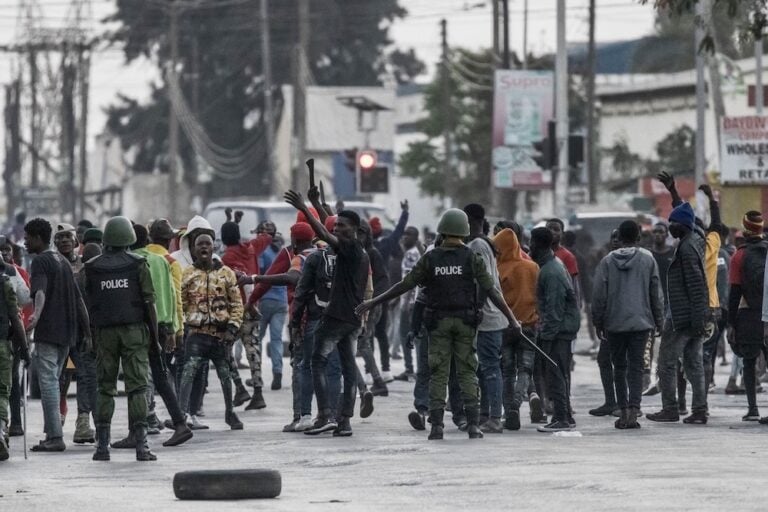Four Zambian journalists have refused to name their sources in regard to a story which alleged that Legal Affairs Minister Remmy Mushota had attempted on 4 April 1996 to cash a Kwacha 210 million (US$ 166 000) government cheque. “The Post” managing editor Bright Mwape and senior journalist Chilombo Mwondela, as well as “Chronicle” newspaper […]
Four Zambian journalists have refused to name their sources in
regard to a story which alleged that Legal Affairs Minister Remmy
Mushota had attempted on 4 April 1996 to cash a Kwacha 210
million (US$ 166 000) government cheque. “The Post” managing
editor Bright Mwape and senior journalist Chilombo Mwondela, as
well as “Chronicle” newspaper journalists Nkonkomalimba Kafunda
and Anthony Mukwita, were summoned on 19 June to appear before a
legal tribunal appointed to verify the journalists’ allegations.
The four could face imprisonment if their story is found to be
false and they continue to withhold their sources.
The four journalists were summoned under the Parliamentary and
Ministerial Code of Conduct Act which contains a clause requiring
journalists to disclose their sources. The Act was passed in
early 1995 amid protests from journalists saying that it was
professionally unacceptable. Meanwhile, investigations into the
case are still continuing and if the tribunal’s initial findings
prove that press allegations against Mushota were false, a second
tribunal will be established to compel the four journalists to
reveal their sources or risk imprisonment.
According to Mwape, the government called for the tribunal when a
member of the public, retired Brigadier General Nicholas Zulu,
requested an inquiry into the matter after reading the
allegations in the press. Zulu is a United Independence Party
(UNIP) member now under custody awaiting trial on charges of
treason for his alleged involvement in a spate of bomb blasts in
May 1996 (see IFEX alert dated 6 June 1996). Mwape said that the
Zambian Constitution has a provision stating that the public can
ask the government to investigate media allegations. The
subpoenaed civil servants stand to be punished if they refuse to
testify before the tribunal and if they are found to have leaked
information to the press.
Mwape told the tribunal that he believed justice would still be
done since “evidence given to the tribunal so far had confirmed
the accuracy of `The Post’ story and my sources would not add any
value to Mushota’s case.”
Meanwhile, Lucy Sichone, a civic activist and freelance columnist
for “The Post”, stated that Mushota had initiated criminal
defamation charges against her, human rights lawyer Rodger
Chongwe, “The Post” editor-in-chief Fred M’membe, “The Post”‘s
Special Projects Editor Masautso Phiri, Mwape, Mwondela, Kafunda
and Mukwita for writing and commenting on the allegations that he
had attempted to cash the ZK 210 million government cheque.
Sichone, however, said that the Mushota case is a testing ground
for the “government’s commitment to transparency and
accountability and we are waiting to see how they will deal with
their minister if found guilty.”
At its 1994 Annual General Congress in Swaziland, MISA called for
the scrapping of the clause in the Parliamentary and Ministerial
Code of Conduct Act requiring journalists writing about political
leaders “to appear before a tribunal to justify stories and to
disclose their sources of information.” The clause was at the
time in its draft form. According to MISA, the clause “undermines
press freedom and gives exclusive privilege to a few individuals
in society, and breaches ethical demands of the profession of
journalism”.
Appeals To


